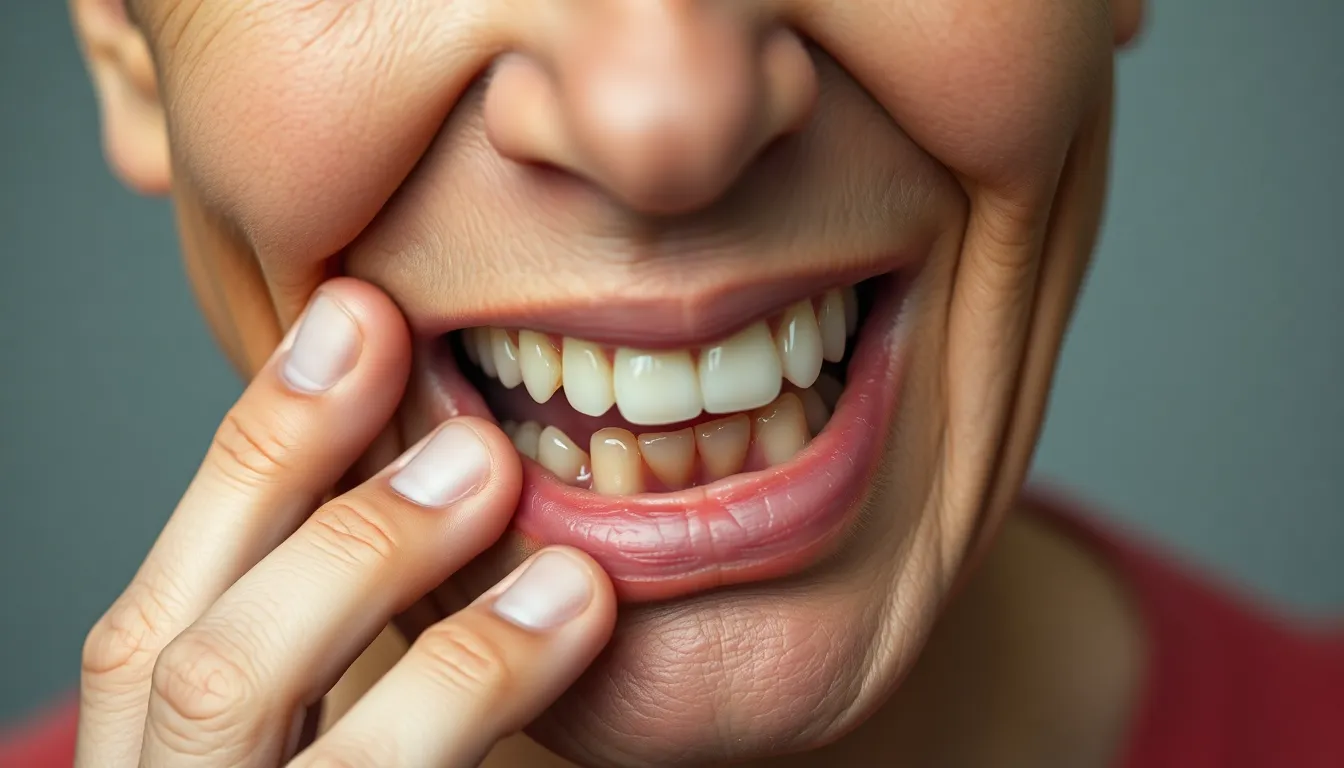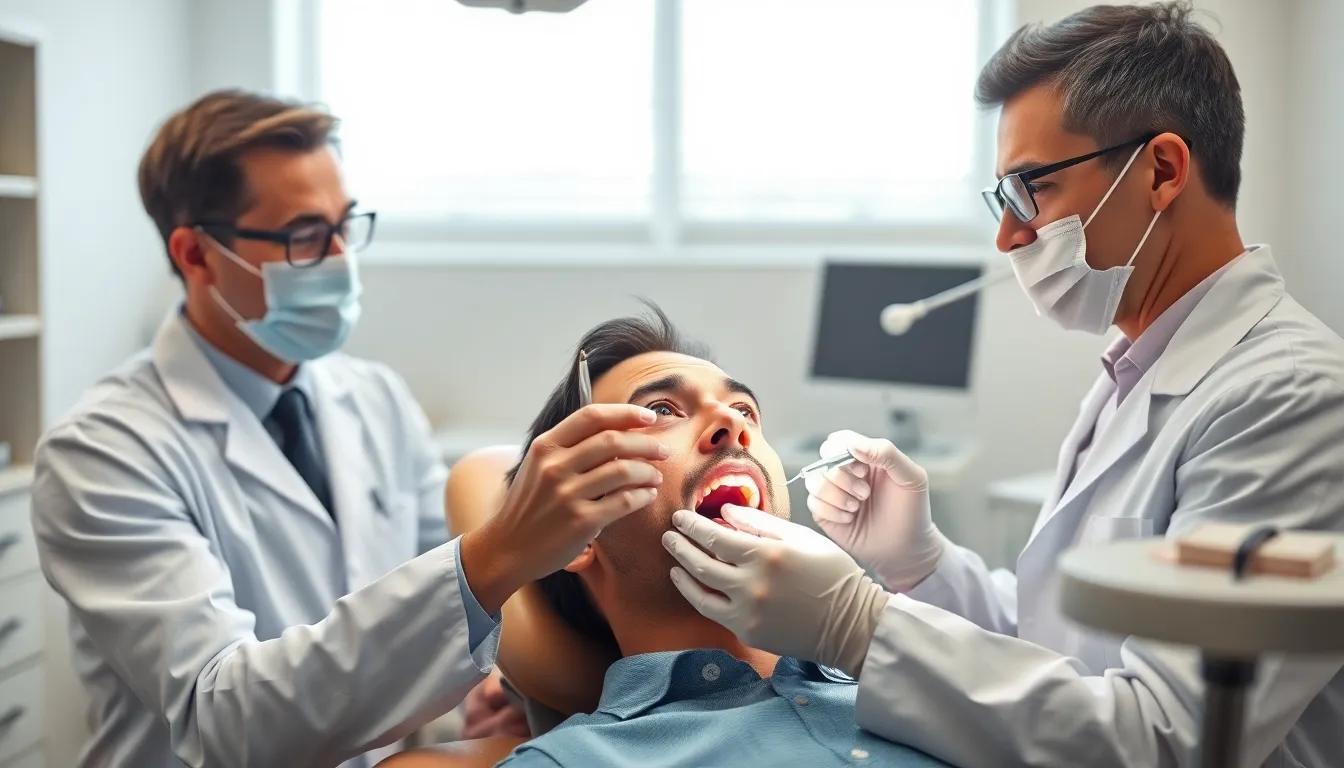Will dentures hurt when you first get them? It’s one of the most common concerns for those considering this dental solution, and understandably so. No one wants to trade one oral problem for a painful alternative.
Adjusting to new dentures typically involves some initial discomfort rather than actual pain. Your mouth needs time to adapt to these foreign objects, much like breaking in a new pair of shoes. Many patients experience temporary issues like increased saliva, minor irritation, or difficulty speaking clearly, but these symptoms usually subside within a few weeks as your mouth adjusts to its new companions.
Understanding Denture Pain: What to Expect
Denture discomfort varies significantly among patients, with most experiencing mild soreness rather than acute pain. Your mouth naturally needs time to adapt to these foreign objects, much like breaking in a new pair of shoes. Many patients report feeling pressure or irritation during the first few weeks of wearing dentures.
“One of my patients, Martha, was incredibly anxious about getting dentures after hearing horror stories from friends,” shares Dr. Todd B. Harris. “She was pleasantly surprised when she only experienced minor gum tenderness that resolved within two weeks of consistent wear.”
Common Causes of Denture Discomfort
Improper fit ranks as the primary source of denture pain, creating pressure points on your gum tissue. Bone resorption occurs naturally after tooth extraction, causing your jaw ridge to shrink and potentially affecting how your dentures sit. Food particles trapped beneath denture bases frequently irritate gum tissues, leading to soreness and inflammation.
Denture sores typically develop when the prosthetic rubs against the soft tissues in your mouth. Speaking and eating movements might exacerbate this friction, especially during the adjustment period. Poor oral hygiene contributes significantly to denture-related discomfort, as bacteria buildup can lead to infections like denture stomatitis.
Timeline for Denture Adjustment
Most patients adapt to their new dentures within 2-4 weeks, with initial discomfort gradually diminishing during this period. Your first 48-72 hours with dentures often involve the most noticeable adjustment sensations as your mouth acclimates to the presence of the appliance. Eating solid foods typically becomes more comfortable after 10-14 days of consistent denture wear.
Speech patterns generally normalize within 1-2 weeks as your tongue and facial muscles learn to work with your dentures. Complete comfort with your dentures usually arrives around the 30-day mark, though this timeline varies based on individual factors. Patients with immediate dentures placed after extractions might experience a longer adjustment period of 6-8 weeks due to healing gums.
How to Minimize Denture Pain
Rinsing with warm salt water (½ teaspoon salt in 8 ounces of water) provides natural relief for irritated gum tissue. Over-the-counter dental adhesives create a cushioning effect between dentures and gums, reducing friction and soreness. Removing dentures for 6-8 hours daily, typically overnight, gives your oral tissues essential recovery time.
Cutting food into smaller pieces reduces the chewing force required, minimizing pressure on sensitive gums. Soft foods like yogurt, eggs, and pasta prove easier to manage during your adjustment phase. Regular dental check-ups enable your dentist to spot fit issues before they cause important discomfort or damage.
Initial Discomfort: The Adjustment Period

Getting new dentures comes with an adjustment period as your mouth adapts to this foreign object. Your gums and surrounding tissues need time to get used to the pressure and presence of dentures, similar to breaking in a new pair of shoes.
Common Sensations During the First Few Days
New dentures often feel bulky or awkward in your mouth, causing irritation and sore spots where they rub against gums. Your mouth produces excess saliva as it responds to having the denture in place – a natural reaction to something unfamiliar. Speaking and eating become challenging initially because your tongue and facial muscles aren’t accustomed to working around the denture.
Many patients experience soreness in exact pressure points where the denture contacts the gum tissue. Sarah, one of our long-term patients, described her first few days with dentures as “feeling like I had something too big for my mouth, and my speech sounded different to my own ears.”
How Long Initial Soreness Typically Lasts
Initial denture soreness generally persists for 2 to 4 weeks as your gum tissue heals and adapts to the new appliance. During this time, the irritation gradually diminishes as your mouth becomes accustomed to the denture’s presence. By weeks 3 to 4, most patients find their dentures feel more comfortable and can begin transitioning from soft foods to a more normal diet.
Dr. Todd B. Harris notes, “The adaptation timeline varies for each patient, but I’ve observed that most people turn a corner after the first month. The body has remarkable adaptive capabilities, and the mouth is particularly resilient.”
Full adjustment might take several months depending on individual factors such as age, oral anatomy, and previous denture experience. The most intense discomfort typically subsides within the first month, giving way to increased functionality and confidence with your new teeth.
Types of Denture-Related Pain

Denture pain stems from several distinct causes that affect wearers differently. Understanding these exact types of discomfort helps you identify and address problems before they worsen.
Pressure Points and Sore Spots
Pressure points develop when dentures don’t properly fit the contours of your mouth. These painful spots occur when ill-fitting dentures slip or move during eating or speaking, creating localized pressure on exact areas of your gums. The uneven distribution of force leads to abrasions and sore spots that can make wearing dentures uncomfortable. Many patients experience these issues when their jaw structure changes over time, causing previously well-fitting dentures to create new pressure points. Dr. Todd B. Harris often notes that “patients who’ve had their dentures for several years without adjustments commonly report sudden pain in exact spots – this typically indicates it’s time for a reline or adjustment.”
Gum Irritation and Inflammation
Your gums can become irritated or inflamed when dentures trap food particles underneath them. This trapped debris promotes bacterial growth, leading to redness, swelling, and painful inflammation. Some patients experience allergic reactions to denture materials like acrylic or resin, resulting in burning sensations or ulcers in the mouth. Poor denture hygiene compounds these problems by allowing bacteria to flourish. Adhesives can also contribute to irritation in sensitive individuals. Jane, a long-term denture wearer, shared: “I developed painful red patches under my upper denture that wouldn’t go away until my dentist identified an allergic reaction to my new adhesive cream.”
Jawbone Soreness
Jawbone discomfort occurs because dentures transfer biting pressure directly to your gums and underlying bone. Unlike natural teeth that distribute force through roots and periodontal ligaments, dentures place all pressure on the surface tissues. This direct pressure frequently causes soreness during chewing, especially if you have dry mouth which increases friction between dentures and gum tissue. Misaligned dentures can alter your jaw’s natural position, straining muscles and nerves around the temporomandibular joint. This misalignment sometimes leads to TMJ disorder with symptoms including jaw pain, headaches, ear discomfort, and neck tension. Patients with persistent jawbone soreness should seek prompt adjustments, as continued pressure on improper areas can accelerate bone resorption.
Factors That Influence Denture Comfort

Multiple elements impact how comfortable your dentures feel when wearing them. Understanding these factors helps explain why some people experience more discomfort than others and what can be done to improve comfort levels.
Quality of Denture Fit
The fit of your dentures directly affects your comfort level throughout the day. Properly fitted dentures conform closely to the unique contours of your gums and oral anatomy, allowing natural movement and reducing pressure points that cause soreness. Ill-fitting dentures often create pain spots, making eating difficult and speaking uncomfortable. Regular adjustments become essential as your mouth changes over time, ensuring your dentures continue to fit properly. Many patients who visit our clinic express immediate relief after having their loose-fitting dentures professionally adjusted, with one patient noting: “I suffered for months thinking discomfort was normal until a simple adjustment eliminated all my pain.”
Your Oral Anatomy
Individual differences in oral structure significantly influence how dentures feel in your mouth. The shape and condition of your gums, bone ridge, and mouth tissues create a unique environment that affects denture stability and comfort. Changes in oral tissues from aging, tooth loss, or gum disease impact how dentures interact with your mouth. Patients with well-formed ridges typically experience better comfort and retention compared to those with important bone loss. Your jawbone naturally changes shape after tooth extraction, which explains why dentures that fit perfectly at first may become uncomfortable months later without adjustments.
Previous Dental History
Experience with dental appliances plays a crucial role in adaptation and comfort levels. Patients who have previously worn dentures tend to adjust faster and report greater satisfaction with new dentures, especially about chewing function and overall comfort. Psychological factors and social considerations influenced by prior expectations also impact your perception of denture comfort. First-time denture wearers often require more adjustment time as they learn to manage their new appliances. The material quality of your dentures significantly affects comfort as well, with modern options like premium acrylic or flexible materials providing a more natural feel, better durability, and less gum irritation compared to traditional materials.
Pain Management Solutions for Denture Wearers

Denture pain can be effectively managed through various approaches ranging from home remedies to professional interventions. Finding the right solution helps ensure your dentures remain comfortable for daily use.
Over-the-Counter Relief Options
Over-the-counter products offer quick relief for denture-related discomfort. Nonsteroidal anti-inflammatory drugs like ibuprofen or acetaminophen reduce inflammation and provide temporary pain relief when taken according to package instructions. Topical gels containing benzocaine can numb sore areas in your mouth, delivering immediate comfort to irritated tissues caused by denture pressure. Warm salt water rinses serve as an effective home remedy that reduces swelling and promotes healing of sore gums, with most patients reporting noticeable relief within hours of application.
| Relief Option | Main Benefit | How to Use |
|---|---|---|
| NSAIDs (Ibuprofen) | Reduces inflammation | Follow dosage instructions |
| Benzocaine gels | Numbs sore areas | Apply directly to painful spots |
| Salt water rinse | Reduces swelling | Mix ½ teaspoon salt in 8oz warm water |
Dr. Todd B. Harris notes, “Many of my patients find remarkable relief with a simple warm salt water rinse several times daily. It’s often the first recommendation I make before moving to medication-based answers.”
Professional Adjustments and Relines
Professional denture modifications address the root causes of persistent discomfort. Dental visits are essential when dentures cause ongoing pain or develop sore spots, as dentists can adjust or reline your dentures to improve fit and eliminate pressure points. Natural mouth changes occur over time due to bone resorption and gum recession, causing previously comfortable dentures to become painful without proper maintenance.
Regular dental check-ups help assess your denture fit and allow for necessary adjustments before minor discomfort becomes important pain. Taking out your dentures overnight gives gums time to rest and recover, reducing the likelihood of developing sore spots and lowering infection risk. Proper maintenance includes soaking dentures in cleaning solution overnight to prevent bacterial buildup that could worsen discomfort.
One patient, Margaret, shared: “After six months of struggling with painful spots on my lower gums, my dentist performed a soft reline that transformed my experience completely. I wish I hadn’t waited so long to seek professional help.”
Attempting to self-adjust dentures often leads to permanent damage and worsened discomfort. Professional intervention ensures precise modifications that address exact pain points while maintaining the structural integrity of your prosthetic.
When to Seek Professional Help

Contact your dentist immediately if you experience persistent soreness, pain, or sores caused by your dentures. Most initial discomfort resolves within the first few weeks, but ongoing issues signal something’s wrong. Dental professionals can identify the exact cause of your pain and provide appropriate answers.
Signs You Need a Dental Appointment
- Persistent pain that lasts beyond 2-4 weeks of getting new dentures
- Visible sores or ulcers that don’t heal within a few days
- Bleeding gums when wearing or removing dentures
- Difficulty eating or speaking that doesn’t improve with time
- Loose dentures that slip even though using adhesives
One of our patients, Margaret, ignored her denture discomfort for months, assuming it was normal. By the time she sought help, she had developed a severe case of denture stomatitis requiring extensive treatment. Early intervention would have prevented her considerable pain and expense.
What Your Dentist Can Do
Professional evaluation determines if your pain stems from ill-fitting dentures, infections, or other complications. Dentists offer several answers to address denture pain:
- Adjustments to remove pressure points causing irritation
- Relines to improve the fit as your gum shape changes
- Treatment for infections like denture stomatitis
- Replacement of damaged or poorly fitting dentures
Early treatment prevents further complications and maintains your oral health. Remember that changes to your jawbone and gum tissue occur naturally over time, making periodic professional assessment essential for comfortable denture wear.
Living Comfortably With Dentures: Long-Term Strategies
Maintaining long-term comfort with dentures requires consistent care and attention to detail. Excellent oral hygiene forms the foundation of comfortable denture wear, including daily cleaning with a soft-bristle brush and specialized denture cleanser. Your gums, tongue, and any remaining natural teeth need regular brushing too, as this prevents infection and reduces irritation during the adaptation phase.
Daily Maintenance Routines
Daily cleaning protects both your dentures and oral health from potential problems. Brush your dentures thoroughly each day using a soft-bristle brush designed specifically for dentures to remove food particles and plaque. Soaking dentures overnight in a cleansing solution helps eliminate bacteria that brushing might miss. Regular cleaning of your mouth tissues promotes healing during the adjustment period and maintains healthy gums for comfortable denture wear.
Regular Professional Care
Scheduling regular dental check-ups ensures your dentures continue fitting properly as your mouth naturally changes over time. Dental professionals recommend visits every six months for denture wearers, even after the initial adjustment period ends. These appointments allow your dentist to identify and address minor fit issues before they cause important discomfort or damage to oral tissues.
Dr. Todd B. Harris notes, “Many patients believe dentures are ‘set it and forget it,’ but the mouth continually changes shape. Regular professional care extends denture life and dramatically improves comfort over the years.”
Adapting Your Diet
Dietary adjustments can significantly enhance your denture experience. Starting with softer foods during the initial 2-4 week adjustment period helps minimize gum soreness. Gradually introducing more challenging foods as you become comfortable with your dentures builds confidence in eating. Cutting food into smaller pieces reduces the pressure applied to your dentures while chewing, leading to greater comfort during meals.
Managing Long-Term Changes
Your mouth naturally changes shape over time, affecting how dentures fit. Bone resorption—the gradual shrinking of jawbone—occurs after tooth loss and continues throughout life. This process often leads to looser dentures and potential discomfort after several years of wear. Denture adhesives offer temporary answers for minor fit issues between dental visits. Professional relines every few years help maintain proper fit as your oral structures change.
One patient, Margaret, shared: “After wearing my dentures comfortably for three years, they started feeling loose. Instead of struggling, I visited my dentist who performed a simple reline procedure. The difference was immediate—my dentures felt secure again, and I could eat without worry.”
Nighttime Care Practices
Removing dentures while sleeping gives your gum tissues essential rest from the constant pressure. This practice reduces inflammation and allows your oral tissues to recover daily. Store removed dentures in water or a denture-soaking solution to prevent them from drying out and warping. Properly stored dentures maintain their shape and fit better when you put them back in each morning.
By the 2-3 month mark, most people find their dentures feel relatively natural, with any initial discomfort largely resolved. Implementing these long-term strategies creates a foundation for years of comfortable denture wear, allowing you to speak, eat, and smile with confidence.
Conclusion
Living with dentures doesn’t have to be painful. While you might experience some discomfort during the initial adjustment period it’s rarely severe and typically resolves within a few weeks. Remember that proper fit is crucial for comfort and everyone’s experience differs based on their unique oral anatomy.
Don’t hesitate to seek professional help for persistent pain rather than suffering in silence. With proper care regular dental check-ups and appropriate pain management techniques you’ll adapt to your dentures and enjoy their benefits.
By implementing the strategies outlined in this text you’ll be well-equipped to minimize discomfort and maximize your denture experience. Soon you’ll be speaking eating and smiling with renewed confidence.
Frequently Asked Questions
Do dentures hurt when you first get them?
Most people experience mild discomfort rather than acute pain when first getting dentures. It’s similar to breaking in new shoes – you may feel pressure, increased saliva production, and some irritation as your mouth adjusts. These sensations typically diminish within 2-4 weeks as your oral tissues adapt to the new appliance.
How long does it take to get used to new dentures?
Most patients adapt to new dentures within 2-4 weeks. The first 48-72 hours are typically the most challenging. Eating solid foods becomes easier after 10-14 days, and speech usually normalizes within 1-2 weeks. Complete comfort is generally achieved around the 30-day mark, though some individuals may require more time.
What causes denture pain?
Denture pain commonly stems from improper fit creating pressure points, trapped food particles causing irritation, friction against soft tissues leading to sores, and poor oral hygiene contributing to infections. Other factors include individual oral anatomy, jawbone soreness from direct pressure, and potential allergic reactions to denture materials.
How can I relieve denture discomfort at home?
Rinse with warm salt water to reduce inflammation, use over-the-counter dental adhesives to minimize friction, and remove dentures for several hours daily to rest your gums. Taking over-the-counter pain relievers like NSAIDs and using benzocaine gels can provide temporary relief. Eating softer foods cut into smaller pieces will also help during adjustment.
When should I see my dentist about denture pain?
Contact your dentist if you experience persistent soreness beyond the initial adjustment period (2-4 weeks), visible sores that don’t heal, bleeding gums, difficulty eating or speaking, or loose-fitting dentures. Delaying professional help can lead to complications including infections, tissue damage, and more severe pain.
Will my dentures need adjustments over time?
Yes. Your mouth naturally changes as you age, particularly after tooth extraction when the jawbone gradually shrinks. Regular dental check-ups are essential, and most dentures require professional relines every 1-2 years to maintain proper fit. Never attempt to adjust dentures yourself, as this can damage them and cause oral injuries.
Can I sleep with my dentures in?
It’s generally recommended to remove dentures while sleeping. This gives your gum tissues time to rest and recover from the pressure of wearing dentures during the day. Removing dentures at night also allows for thorough cleaning and helps prevent potential infections and complications from constant wear.
How do I properly clean my dentures?
Clean dentures daily by brushing with a soft denture brush and mild soap or denture cleaner (avoid regular toothpaste which can be abrasive). Soak them overnight in a denture-specific solution to kill bacteria. Rinse thoroughly before reinserting. Regular cleaning helps prevent irritation, bad breath, and infections.







